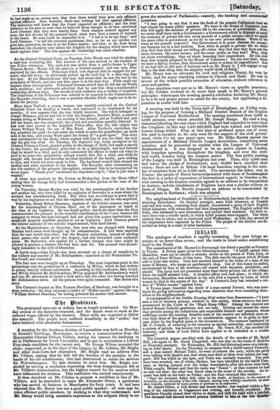sbt ljrobinces.
The protracted turn-out at Ashton has at length terminated. On Mon- day several of the factories reopened, and the hands went to work at the reduced wages offered by the masters. Other mills are expected to follow the example. The people have suffered dreadfully in the "strike," but have behaved with admirable forbearance.
A meeting for the Southern division of Lancashire was held on Monday, in Newall's Buildings, Manchester, to receive a communication from the Honourable Charles Pelham Villiers, stating his reasons for declining to sit in Parliament for South Lancashire, and to put in nomination a Liberal Free-trade candidate for the vacant seat. Mr. George Wilson occupied the chair; supported, as in the days of the League, by Mr. Cobden, Mr. Bright, and other Anti-Corn-law champions. Mr. Bright read an address from Mr. Villiers, stating that he had left the decision of the question in the Lands of his old constituents; who had determined to retain his services for Wolverhampton. To this decision he must bow. Mr. Bright con- cluded by moving a resolution expressing the deep disappointment felt at Mr. Villiers's determination, but the highest respect for the motives which have influenced his decision. This resolution was carried unanimously. It then devolved on Mr. Cobden to propose a candidate in lieu of Mr. Villiers; and he proceeded to name Mr. Alexander Henry, a gentleman who has carried on business in Manchester for forty years. It bad been objected that Mr. Henry was not a good public speaker; all men may be- come efficient public speakers, by sticking to what they understand; and 24r. Henry would bring extensive experience to the subjects likely to en-
gross the attention of Parliament,—namely, the banking and columnist' questions.
" I was going to say that it was the fault of the pent Parliament that we had almost too many public speakers. We want in the House d 00111M01111 Men who will apply the maxims of private life to the concerns of governitiiiiit.. Now, we never shall have such a Government—a Government which is disposed to' the economy of private life into every pursuit of a public nature*-until we apply the same rules to government as we do to our own private affaits. What do we want at the present moment ? Our Government is in great distress for money; our finances are in a bad position. Now, what do people in private life do when they find that their means are falling off—when they find that they have not the same revenue, the same income, and the same profits as they had? Why, they set about retrenching; they set about lessening their expenditure. Do you ever hear that remedy proposed in the House of Commons ? Do you ever bear, when we have a failing income, that Government seeks to reduce its expenditure? But if we had 350 or 360 men of business such as Mr. Henry is, I will engage to say that is the first thing that the majority would think of doing." Mr. Henry was an advocate for civil and religious liberty, for vote by i ballot, and for many searching reforms in Church and State. He was in favour of the widest possible extension of education, without reference to sects and parties. Some questions were put as to Mr. Henry's views on specific measures; but Mr. Cobden declined to do more than speak to Mr. Henry's general principles: whereupon the meeting passed a resolution declaring Mr. Henry to be a fit and proper person to stand for the county, but appointing a de- putation to confer with him.
A meeting was held in the Town-hall of Birmingham, on Friday even- ing, for the purpose of forming a Midland District Branch of the English League of Universal Brotherhood. The meeting numbered from 5,000 to 6,000 persons; over whom presided Mr. Joseph Sturge. He read a long statement:showing the vast sums which England had expended in wars since the Conquest: in this way 1,437,000,0001. had been wasted, and 3,910,000 human beings killed. Even at this time of profound peace, out of every 20s. paid in taxation 2s. 6d. only went for the support of the civil govern- ment, while 17s. 6d. was spent upon war. Mr. Elihu Burritt moved the appointment of a Midland District League Association, comprising seven counties; and he proceeded to explain what the League of Universal Brotherhood is. It was designed to be an active parent in London, with branches spreading throughout the kingdom, and over the civil- ized world, London being the common centre. The first public meeting of the League was held in Birmingham last year. Then, only 5,000 men had taken the pledge of brotherhood; now, 50,000 have enrolled their names: there are now in Britain 150 local branches, varying in the num- ber of members from 25 to 2,500 each. The movement has taken root in France: the people of Havre have.reciprocated with those of Southampton the first in a series of expressions of international regard; in October a dis- trict meeting in the Eastern counties agreed to an address to be transmitted to Amiens; and the inhabitants of Brighton have sent a similar address to those of Dieppe. Mr. Burritt proposed an address to be transmitted by Birmingham to Bordeaux; which was adopted.
The neighbourhood of Crookhall, in Northumberland, has been the scene of an alarming disturbance. On Sunday sennight, some Irish labourers at Conside coal and iron works, returning from chapel, encountered a party of their English fellow labourers, with whom there had been disagreement. The English pelted the Irish, who retreated to arm themselves and recruit their numbers. On their re- turn there was a terrific battle, in which 4,000 persons were engaged. The whole country was in alarm, and so continued until Wednesday: on that day several of the ringleaders were captured by the Police. The people of the district are de- scribed as being in a state of utter barbarism.


























 Previous page
Previous page